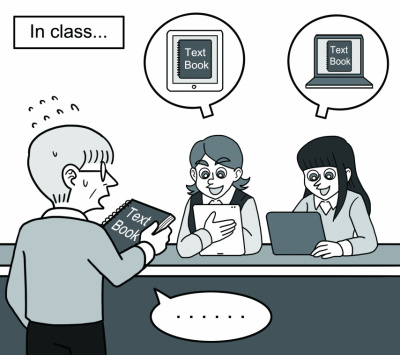
Students who cannot – or choose not to – purchase all necessary textbooks have turned to owning scanned copies of books because it is much cheaper.
“Unlike hard copy textbooks which cost about 30 won per page, scanned copies only charge 5 to 10 won per page,” said Kim Hui-yeon (Hongik University, 4), who is a frequent user of scanned textbooks. “It is even cheaper than e-books, whose prices are set 40 percent lower than those of printed copies. The cost of scanned textbooks are one-sixths of the original cost.”
Furthermore, because one gadget can carry multiple textbook materials, students regard this method to be a lot more portable and convenient.
“Ever since I bought my own tablet PC, I decided to scan my textbooks and carry them with me,” Kim Hee-jin (Yonsei University, 2) said. “This method is more preferable as it allows me to carry more than one textbook all at once, which is especially helpful during the exam period.”
In contrast to photocopying textbooks, scanning itself does not violate the copyright law if it is only for personal use. However, some people believe that book scanning on campus also infringes copyright, just in another form. In addition, since it is easy to share scanned copies of textbooks online through e-mail or other measures, book scanning is likely to violate the authors’ copyrights.
The MCST announced in 2011 that it is illegal to scan books without the permission of the author. Nevertheless, there is still no set regulation that monitors the use of every scanned copy on campus. The copyright law does not classify the scanner, the main tool used for book scanning, under the category of an illegal machine generating book copies. The MCST plans to adopt more effective measures to prevent other forms of copyright violation.
“It is hard to distinguish between personal and commercial use of scanned copies on campus, since it is mostly practiced privately,” said an official of the MCST, who wishes to remain anonymous. “The government will work on coming up with effective regulations to monitor book scanning and prevent commercial use of copies.”
Chung Che-yoon
thfl353@ewhain.net

